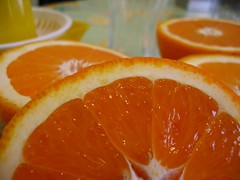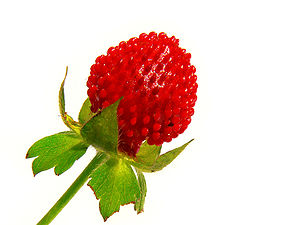Topical Vitamin C - uses & products
Welcome to the 3rd post in the series of Vitamins that you apply to your skin. Today we take a look at the very famous cold & cough fighter Vitamin C
Easy at Home Vita C pack
Mix strawberry (along with seeds - act as exfoliant) /papaya pulp with few drops of Amla juice and scrub skin gently.
Let it dry. Wash off with plain water.
Use this not more than once a week.
Copyright@2009: Tanveer Parmar
WHAT:
- Prevents and treats sun-damaged and inflamed skin.
- Neutralises free radicals in skin that destroy collagen (imp if you like in a polluted environment or smoke cigges)
- Promotes Collagen production
- Reduces Hyperpigmentation, lightens skin tone.
HOW:
- It acts as a powerful anti-oxidant, that is, scavenger of free radicals, seeking out and binding to these potentially dangerous errant molecules created by smoking, exercise, sun exposure, pol
lution and other environmental factors, and even the body's normal chemical reactions. - Topical C has also been shown to boost collagen production, which is the reason you may notice improved skin texture, firmness, and tone when using it. The two most important amino acids in the skin, proline and lysine need the presence of Vitamin C to create collagen.
- Unlike creams formulated with Retin A (Topical Vitamin A) and Alfa Hydroxy Acids, which work by exfoliating the older, outer skin layers, vitamin-C formulations work within the skin layers, inhibiting the production of free radicals and spurring the synthesis of collagen. Working at this cellular level, vitamin C helps "reweave" the skin fibers. As cells bind together, skin looks more smooth and youthful.
- Vitamin C also functions as a TYROSINASE inhibitor. Tyrosinase is an enzyme that brings about a cascade of reactions in the skin that stimulate melanin production, the protein skin pigment that gives you color, or in excess can give you hyper pigmentation, or dark spots. MAP works to inhibit (slow down/block) that enzyme.
EFFECTS & SIDE-EFFECTS: Because topical vitamin C has known anti-inflammatory properties, it's less likely to irritate the skin than vitamin A. In fact, dermatologists often use it to help treat a variety of inflammatory skin problems, including acne and eczema.
However some individuals are known to react adversely to it. It may cause a temporary stinging sensation when applied to the skin.
PRODUCTS TO TRY:
Health and beauty aids manufacturers have added vitamins to skin creams for years. However, the low-concentration formulations, ingredient instability, and rapid deterioration of vitamin-C compounds, along with its blending with other elements, rendered the vitamin inert. Consequently, the creams did not achieve the benefits promised.
However newer vitamin-C formulations are amalgated in delivery systems called liposomes or nanospheres (the Vitamin is surrounded by oil) that stabilize the vitamin within the preparation, and shield it from factors that could affect it.
1. Ponds Age Miracle product line
2. Fair & Lovely MultiVitamin product line
3. H2O+ Waterwhite range
4. Neutrogena Moisture Defence and deep hydrating mask,
5. Clarin’s Paris Truly Matte range,
6. Garnier Skin Naturals Light for Men and Women,
7. L’Oreal Paris Dermo-Expertise white perfect toner,
2. Fair & Lovely MultiVitamin product line
3. H2O+ Waterwhite range
4. Neutrogena Moisture Defence and deep hydrating mask,
5. Clarin’s Paris Truly Matte range,
6. Garnier Skin Naturals Light for Men and Women,
7. L’Oreal Paris Dermo-Expertise white perfect toner,
8. Vichy Bi-white advanced whitening hydrating fluid
9. Himalaya Herbals Almond & Cucumber peel-off face mask.(has Amla - Indian Gooseberry which is very rich in Vitamin C)
10. The Body Shop has an entire line of skincare products formulated with Vitamin C as the main active ingridient.
11. Kiehl's Powerful Line Reducing Concentrate with 10.5% Vitamin C
10. The Body Shop has an entire line of skincare products formulated with Vitamin C as the main active ingridient.
11. Kiehl's Powerful Line Reducing Concentrate with 10.5% Vitamin C
DIY Tips:
Incorporate fruits & vegetables like amla, guava, papaya, oranges, lemons, strawberries as part of your home made facials & skin care routine.
- A study published last year in the Journal of the American Academy of Dermatology found that vitamin C appears to provide superior protection from sun damage when used in conjunction with vitamin E. One reason that the two antioxidants work better when applied together is that C helps regenerate E that has been inactivated by free radicals. Neither vitamin C nor E absorbs the sun's harmful rays, so both should always he used in addition to sunscreen, never in place of it.
- After application, topical Vitamin C is readily absorbed and cannot be washed off by water or perspiration. The protective benefits last several days.
- Minimal exposure to UV can decrease the body's Vitamin C content by 30%. City pollution can take this up to 50%.
- Apply a few drops of Amla juice to the face twice a week for 20 minutes.
- Orange and lemon peels can be dried, powdered and used as scrub.
Easy at Home Vita C pack
Mix strawberry (along with seeds - act as exfoliant) /papaya pulp with few drops of Amla juice and scrub skin gently.
Let it dry. Wash off with plain water.
Use this not more than once a week.
Copyright@2009: Tanveer Parmar



![Reblog this post [with Zemanta]](http://img.zemanta.com/reblog_a.png?x-id=9d3cc8fe-a19d-4f81-9d88-d5f7de0bbc54)


wow..nice research..
ReplyDeletei tried it on..to get rid of acne..but my skin really hates lemon..it got much worse.. hahaa.. :)
Hi Zwala,
ReplyDeleteThanks for the compliment :) :)...
Vitamin C is not very effective to get rid of Acne. Lemons & vitamin C solutions are acidic so they inhibit bacteria, but they also make the skin a little sensitive.. A better bet would be to try Vitamin A as that has been proven to show anti-acne results..
Thanks for your interest in the blog. :)